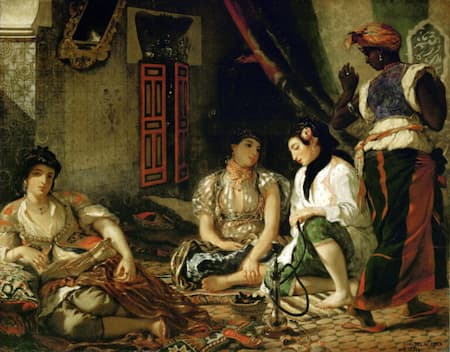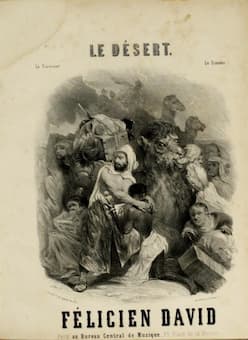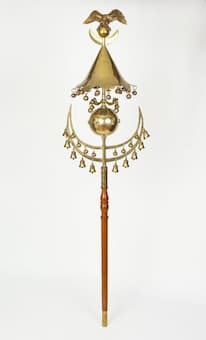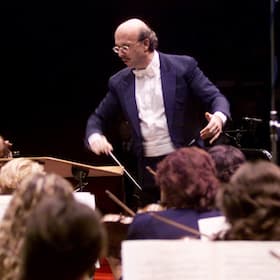French composer Félicien César David (1810-1876) composed his symphonic ode, Le Désert, in 1844, setting the poetry by August Colin. This work for speaker, tenor soloists, male chorus and orchestra was the perfect piece for the new Orientalists. As Victor Hugo noted in 1829, under Louis XIV everyone was a Hellenist and revered Greek culture, now the Orient was in fashion. Writers such as Nerval, Gautier, and Flaubert included oriental scenes in their work, and painters such as Delacroix, Ingres, Chassériau, and Regnault did as well.

Eugène Delacroix: The Women of Algiers, 1834 (The Louvre, Paris)
Politically, Napoleon was frustrated in Egypt and successful in Algeria, so the eyes of France were on the Orient. It was a place for potential political expansion and mineral exploitation and had a reputation in the European imagination for being a place for the mysterious, the fabulous, the forbidden, in short, everything that the narrow morality of 19th-century France prohibited.

Cover page of Le Désert
Félicien César David was a member of the Saint-Simonian Order, an early socialist order. Led by Claude Henri de Rouvroy, comte de Saint-Simon, they believed that the new spirit of industrialization and scientific discovery would have profound changes on society. Society would abandon traditional ideas of temporal and spiritual power and develop a society based on ‘true equality.’
The count died in 1825 and his followers began to split. One group departed for Asia to find their predicted female Messiah. The influence of the group led to a kind of practical Saint-Simonianism that resulted in projects such as the Suez Canal and the development of the bank Crédit Mobilier. The Suez Canal would assist in a movement to Asia in search of Messianic revelations, as well as aid commerce.

19th century Jingling Johnny with 28 jingle bells and 10 small bells with internal clappers
(University of Edinburgh)
The resident composer of the Saint-Simonians was Félicien César David. He accompanied the group on their journey to find their female messiah. The journey departed in March 1833 and went to Istanbul, Smyrna, Jaffa, Jerusalem, and then Egypt where the expedition folded in 1835 without success. David returned to France and used the notes he’d taken on the trip to publish a set of 22-character pieces and album leaves for the piano in 1845 under the title Les brises de’Orient (The Breezes of the Orient).
His most famous piece, however, was Le Désert, his three-part symphonic ode. It’s considered the start of music exoticism, with a text by another Saint-Simonian, Auguste Colin.
The conceit is that the setting is a day (part 1) and night in the desert (part 2), starting with the hush of the desert morning, the appearance of the caravan, a sandstorm, the calm after the storm, and, as they settle for the night, the dancing.

Guido Maria Guida
In the morning is sunrise (part 3) and the call of the muezzin, and the caravan’s disappearance into the distance. Despite its oriental setting, it’s an example of pure Saint-Simonianism. The caravan represents human society. They do their daily work, are beset by nature’s sandstorm, celebrate in the evening, and give praise to god in the morning. The title of ‘Symphonic Ode’ was a not-so-subtle reference to Beethoven’s appeal to universal harmony in his 9th symphony – the work was entitled an ‘Ode-Symphony’ in France. Other Beethoven parallels in the work are the clear depiction of nature (as in Beethoven’s Pastoral Symphony).
The Arabian Fantasy that brings part 2 to an end is pure orientalism. The rhyme is from Arabic models and the melody comes from Syria. The accompaniment on the tonic and sub-dominant, is a pure drone, as in bagpipes. The sound, accompanied by cymbals, comes from older ‘oriental’ models in the west that would use the jingling johnny – the Turkish crescent.
Félicien César David: Le Desert – Part II: Arabian Fantasy
Italian conductor and pianist Guido Maria Guida (b. 1956) studied at the Turin and Milan conservatories before doing additional studies in Paris and Sienna. From 1982 to 1994 he worked as musical assistant to Giuseppe Sinopoli, and was a regular conductor of the Berlin Radio Symphony Orchestra. His recent conducting activity has mainly involved opera, conducting in Mexico, Houston, and did an entire Ring cycle in Mexico City between 2003 and 2006.

Félicien César David: Le Desert – Part II: Arabian Fantasy
Performed by
Berlin Radio Symphony Orchestra
Guido Maria Guida
Official Website
For more of the best in classical music, sign up to our E-Newsletter

